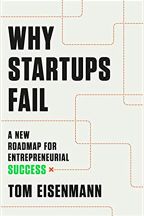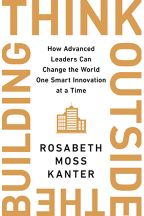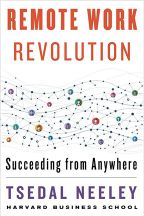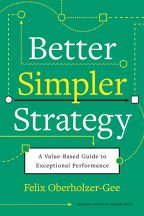Thank You.
As a member of the HBS Fund Investors Society in fiscal year 2021 (July 1, 2020–June 30, 2021), you fueled Harvard Business School’s efforts to educate leaders who make a difference in the world. The School relies on your generous annual support of the HBS Fund to foster innovation while also strengthening core programs and priorities. This report, produced specially for members, highlights examples of activities that you helped make possible.
$33.5M
Total gifts from Investors Society members in FY21—equivalent to the annual payout
from an $835 million endowment
1,607
Leadership donors who qualified for Investors Society membership in FY21—donating
78% of all HBS Fund dollars in FY21
$600K+
Total gifts to the HBS Fund in support of Diversity & Equity
Through teaching, research, programming, and outreach, HBS strives to increase diversity and equity on campus and in business and society.

All first-year MBA students participated in a case discussion on the Tulsa Massacre
of 1921. The new case, written by Professor Mihir Desai and available free to the
general public, considers how to address historic injustices, as well as the importance
of having difficult conversations and approaching them with empathy.
All first-year MBA students participated in a case discussion on the Tulsa Massacre
of 1921. The new case, written by Professor Mihir Desai and available free to the
general public, considers how to address historic injustices, as well as the importance
of having difficult conversations and approaching them with empathy.

How to Create Glass-Shattering Organizations
Despite significant progress over the past 50 years, women still hold only a fraction
of leadership positions and board seats at major companies, earn less than their male
counterparts, and experience sexism at work. In their new book, Glass Half-Broken: Shattering the Barriers That Still Hold Women Back at Work, Colleen Ammerman and Boris Groysberg explore why these inequalities persist and
recommend best practices to help organizations achieve parity and improve performance
and value. Ammerman is director of the HBS Gender Initiative, and Groysberg is the
Richard P. Chapman Professor of Business Administration.
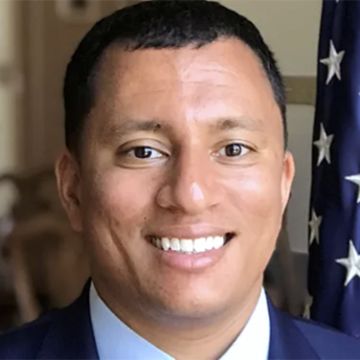
40 Years of PRIDE
On the MBA Admissions blog, Joe Panikulam (MBA 2022), a former US Navy submarine officer, writes about becoming co-president of PRIDE, the HBS club for lesbian, gay, bisexual, transgender, queer, and questioning students. PRIDE works to build community, foster professional development, and encourage advocacy at HBS and in business. “I never even knew that I needed such a community until I got to HBS,” says Panikulam. “It has changed my perspective on everything.” He is honored to continue the club’s 40-year legacy.
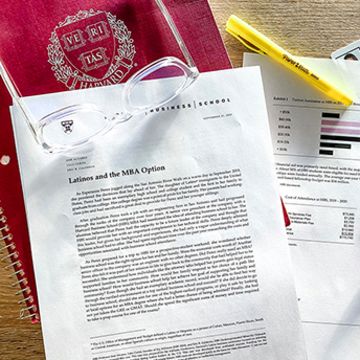
Addressing the Concerns of Latinx Students
A new case highlights the doubts and fears facing Latinx students considering an MBA—such as being able to support their family and community, leaving a lucrative job, alienating family members who don’t understand the value of a business degree, and not fitting in. The case, written by senior lecturer Jose Alvarez, Lulu Curiel (MBA 2010), and Eric Calderon (MBA 2013), aims to personalize and normalize the experience for prospective Latinx students while introducing them to HBS’s signature case method.

Diversifying HBS’s Case Collection
Recognizing that, historically, too few protagonists in its case collection were from underrepresented groups, HBS has made a commitment to developing more cases that reflect the diverse composition of the student body and society as a whole. In the past year, faculty members have completed 160 new cases that focus on race and racism, or feature protagonists who are Black or African American, Latinx/Hispanic, Asian or Asian American/Pacific Islander, or Native American or other Indigenous people.
HBS continually innovates across its educational programs to ensure that graduates are prepared to lead in an ever-changing world.
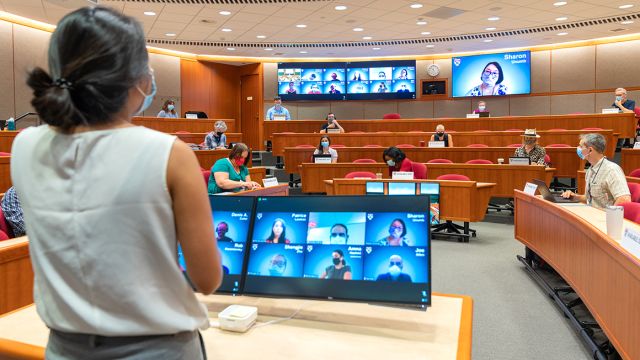
HBS utilized design thinking to develop a safe and engaging learning experience for
all students. Twenty-one specially equipped hybrid classrooms enabled both in-person
and remote students around the world to participate simultaneously in case discussions.
HBS utilized design thinking to develop a safe and engaging learning experience for
all students. Twenty-one specially equipped hybrid classrooms enabled both in-person
and remote students around the world to participate simultaneously in case discussions.
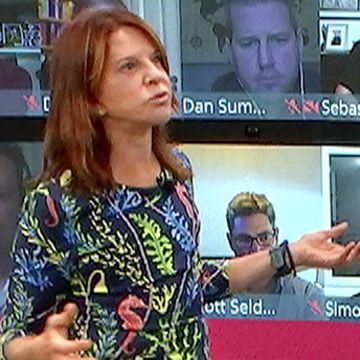
Executive Education Moves Online
When the pandemic forced Executive Education to cancel or postpone its upcoming programs in March 2020, the School accelerated the completion of two new HBS Live Online Classrooms that provide a state-of-the-art, real-time remote learning environment. This was key to the School’s ability to bring 90 percent of Executive Education programs online. Enrollment was strong with thousands of participants, and program evaluations were high. Going forward, Executive Education plans to offer a mix of on-campus, virtual, and blended programs.
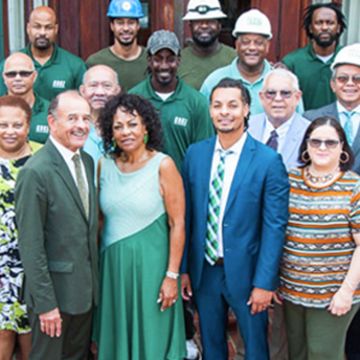
Students Partner with Black-Owned Businesses
A new field-based elective, Scaling Minority Businesses, aims to make a lasting difference in the fight for racial justice and in the greater Boston community. Through relevant cases and guest speakers, students learn about the impact of institutional racism on economic development, entrepreneurship, and access to capital and customers. They also serve as consultants to local, Black-owned businesses that are ready for scale, such as Cruz Companies, a third-generation family construction business (pictured). John Cruz III, president and CEO, said, “I’m excited . . . to have some of the best thinkers and teachers out there critique us and help us move forward.”
The HBS faculty conducts research on wide-ranging issues facing business and society. Their ideas underpin the School’s educational programs and influence management practice worldwide.

HBS views business as a powerful means for improving society and strives to play a
role in tackling systemic challenges like climate change, health care, and wealth
inequality. Five examples illustrate how HBS pursues this goal through impactful
faculty research.
HBS views business as a powerful means for improving society and strives to play a
role in tackling systemic challenges like climate change, health care, and wealth
inequality. Five examples illustrate how HBS pursues this goal through impactful
faculty research.
New Faculty Books
Books are one of the key ways that HBS faculty members share their insights with leaders
around the world. Often the culmination of years of research and inquiry, these books
address a wide range of topics.
Generous need-based financial aid enables the most talented students, regardless of their financial means, to attend HBS and to pursue a wider range of careers.

Nora Rabah (MS/MBA 2022), who grew up in an immigrant family without health care,
aspires to make life-saving drugs more accessible and affordable as a biotech executive.
She enrolled in the new MS/MBA Biotechnology: Life Sciences joint degree program to
hone her leadership and managerial skills.
Nora Rabah (MS/MBA 2022), who grew up in an immigrant family without health care,
aspires to make life-saving drugs more accessible and affordable as a biotech executive.
She enrolled in the new MS/MBA Biotechnology: Life Sciences joint degree program to
hone her leadership and managerial skills.
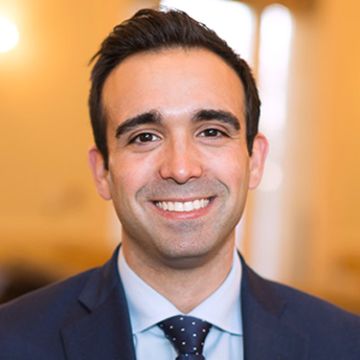
Reflecting on the Importance of Scholarships
In a short video, David Chan (MBA 2018) talks about what scholarships have meant to him—as a student and today as an entrepreneur. Scholarships enabled him to attend HBS, pursue his interest in climate change on campus, and ultimately develop the skills and courage to help found FarmTogether, a startup that makes sustainable farmland investments available to all investors.
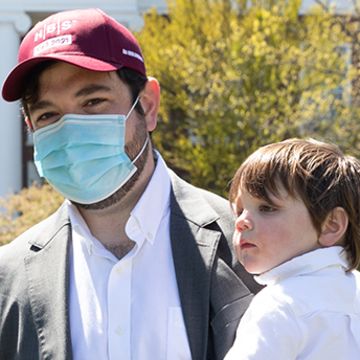
New Financial Aid Support
HBS introduced two new scholarships in 2020 in response to the evolving needs of students. A COVID Hardship Fund helped students whose financial circumstances were negatively affected by the pandemic, and a Childcare Scholarship was piloted to help families in which parents are in school or working. These scholarships joined an already comprehensive financial aid program that makes HBS accessible to talented students regardless of their backgrounds. Nearly 50 percent of MBA students receive need-based financial aid, and all doctoral students receive a fellowship that includes tuition and a generous living stipend.
HBS provides opportunities for students to develop global understanding and for faculty members to study and shape global business practices.
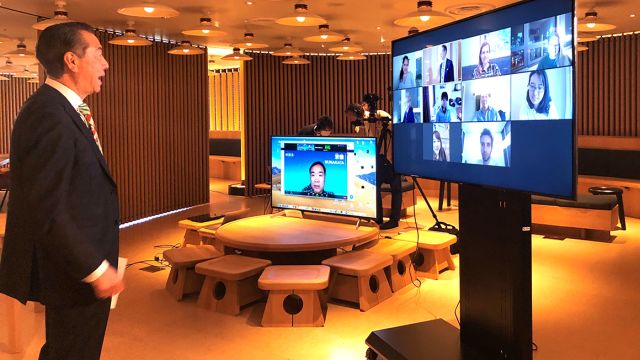
Professor Hirotaka Takeuchi, who created an annual Immersive Field Course in Japan
after the 2011 earthquake, tsunami, and nuclear explosion, hosted a virtual reunion
to mark the course’s 10-year anniversary. The reunion drew about 130 guests, including
alumni who took the course and past project partners.
Professor Hirotaka Takeuchi, who created an annual Immersive Field Course in Japan
after the 2011 earthquake, tsunami, and nuclear explosion, hosted a virtual reunion
to mark the course’s 10-year anniversary. The reunion drew about 130 guests, including
alumni who took the course and past project partners.
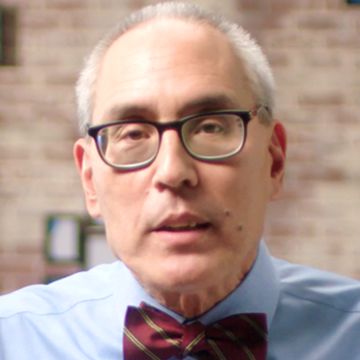
New Global Business Course
Launched just over two years ago, Harvard Business School Online’s course on Global Business has enrolled more than 2,000 learners from 94 countries to date. Taught on HBS Online’s custom interactive platform by Forest Reinhardt, the John D. Black Professor of Business Administration, the course is designed to help participants assess global opportunities, manage risk, and create and capture value for their organizations. The course, which features insights from nine practitioners across business and government, is resonating with learners, who have praised Reinhardt’s excellent teaching and raved that “the firsthand access to these leaders can’t be found anywhere else.”
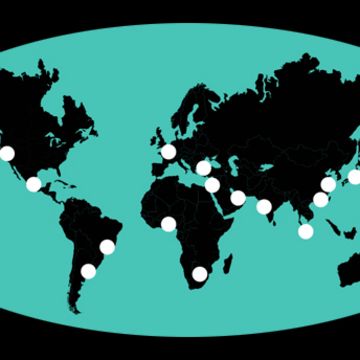
Global Research Centers Deepen HBS’s Engagement and Impact
In the past two decades, HBS has opened 15 research centers and offices that span five continents. They assist faculty with research and case writing, strengthen relationships with local alumni and practitioners, facilitate faculty and student immersions abroad, and host MBA admissions and career development events. These centers and offices play a critical role in the School’s efforts to build expertise in business practices around the world and to enhance the global intelligence of students and faculty.
HBS partners with other Harvard schools on projects that leverage their unique strengths and increase the University’s collective impact in the world.
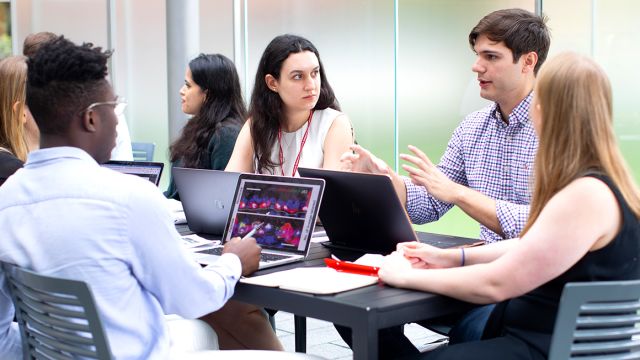
Last fall, Harvard welcomed the first students to its new MS/MBA Biotechnology: Life
Sciences joint degree program. Offered by HBS, the Faculty of Arts and Sciences, and
Harvard Medical School, the program is the first of its kind to address the unique
intersection of science, strategy, finance, ethics, and people.
Last fall, Harvard welcomed the first students to its new MS/MBA Biotechnology: Life
Sciences joint degree program. Offered by HBS, the Faculty of Arts and Sciences, and
Harvard Medical School, the program is the first of its kind to address the unique
intersection of science, strategy, finance, ethics, and people.

Empowering School Leaders
How do you help school principals become great leaders? That question inspired a collaboration between HBS and the Harvard Graduate School of Education (HGSE) that created the Certificate in School Management and Leadership. This innovative program, which is designed to give principals the tools to build and lead high-performing schools, combines HBS’s expertise in managing teams and organizations with HGSE’s strength in school and instructional leadership. The certificate comprises four courses that are delivered online so principals can log on when it’s convenient for them. Since its launch in 2018, more than 10,000 principals and assistant principals have enrolled in the program.
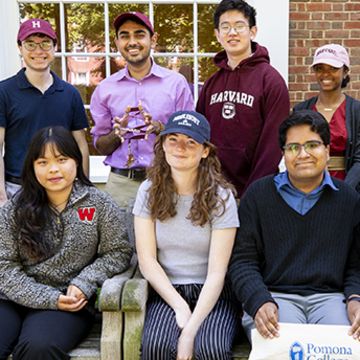
Building the PhD Pipeline
This past summer, a dozen Harvard undergraduate students were joined by peers from 17 other schools, including Pomona, Yale, the University of Michigan, and the Historically Black College Philander Smith for the Program for Research in Markets and Organizations (PRIMO). HBS created the 10-week program in 2011 to introduce a select group of motivated undergraduates to academic business research and potentially future doctoral study. The students utilized the School’s hybrid classrooms and assisted faculty with research on topics ranging from corporate social responsibility to entrepreneurship to finance; most also lived on campus. Since PRIMO’s launch, nearly 200 Harvard students have participated.
HBS Fund Investors Society Members
HBS gratefully recognizes alumni and friends who made leadership contributions to
the HBS Fund in fiscal year 2021.
(login required)

